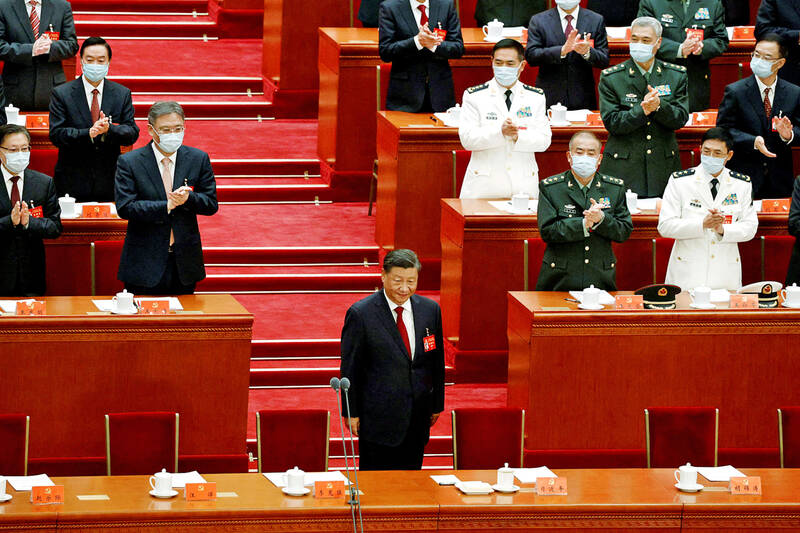Chinese President Xi Jinping’s (習近平) remarks about Taiwan at the Chinese Communist Party’s (CCP) 20th National Congress yesterday were intended as a warning to the US, Taiwanese academics said.
Xi said in his opening speech at the congress that “the issue of [China’s unification with] Taiwan is for Chinese to solve, and for Chinese to make decisions on,” and China would “never renounce the use of force” in the effort.
Other statements related to Taiwan in the final report from the congress included references to “peaceful reunification,” adapting China’s “one country, two systems” framework to Taiwan, Beijing’s “one China” principle and the “1992 consensus.”

Photo: Reuters
The so-called 1992 consensus refers to a term that former Mainland Affairs Council chairman Su Chi (蘇起) in 2006 admitted making up in 2000.
Xi also said there is “strong support for patriotic reunification” among Taiwanese.
The congress showed a clear focus on opposing interference by external forces in what China views as internal issues, Taiwan Society of International Law deputy secretary-general Lin Ting-hui (林廷輝) said at a forum held by the Cross-Strait Policy Association in Taipei yesterday.
Xi’s comments were meant to draw a red line around Taiwan for the US’ awareness and to serve as a warning to Washington, he said.
US-China relations are likely to grow more unstable, which could affect Taiwan, he said, adding that Taipei should prepare for such a contingency.
Some statements about Taiwan were new to this year’s CCP congress, association secretary-general Wang Chih-sheng (王智盛) said.
Among the remarks in the final report was a claim by Xi that China was “putting our best effort into unifying Taiwan peacefully, but will not renounce the use of force if necessary,” as well as claims that China had “always worked to benefit Taiwanese compatriots, and works at promoting cross-strait exchanges.”
The final report also said that China was “working to improve the ‘one country, two systems’ framework,” and that it would need to “consult with people from all parties and all walks of life in Taiwan” on its implementation.
The CCP congress this year was largely focused on opposition to Taiwan’s independence, as well as to foreign interference in what China sees as its own affairs, National Chengchi University Graduate Institute of East Asian Studies professor Wang Hsin-hsien (王信賢) said.
Beijing sees the issue of Taiwan as being inseparably related to its strategic competition with the US, Wang said.
“In the past, China was in a rush to deal with Hong Kong, and was slower in its approach to Taiwan,” he said. “Now Beijing sees Hong Kong as having stabilized, but there’s been some developments regarding Taiwan, so its likely to shift focus.”
The previous National Congress report in 2017 mentioned the “1992 consensus” several times, but this year the report only mentioned it once, he said.
“This shows that Beijing is no longer seeing the issue of Taiwan as being only about the cross-strait relationship. For Beijing, the Taiwan issue is now embedded in the US-China relationship,” he said.

‘DENIAL DEFENSE’: The US would increase its military presence with uncrewed ships, and submarines, while boosting defense in the Indo-Pacific, a Pete Hegseth memo said The US is reorienting its military strategy to focus primarily on deterring a potential Chinese invasion of Taiwan, a memo signed by US Secretary of Defense Pete Hegseth showed. The memo also called on Taiwan to increase its defense spending. The document, known as the “Interim National Defense Strategic Guidance,” was distributed this month and detailed the national defense plans of US President Donald Trump’s administration, an article in the Washington Post said on Saturday. It outlines how the US can prepare for a potential war with China and defend itself from threats in the “near abroad,” including Greenland and the Panama

The High Prosecutors’ Office yesterday withdrew an appeal against the acquittal of a former bank manager 22 years after his death, marking Taiwan’s first instance of prosecutors rendering posthumous justice to a wrongfully convicted defendant. Chu Ching-en (諸慶恩) — formerly a manager at the Taipei branch of BNP Paribas — was in 1999 accused by Weng Mao-chung (翁茂鍾), then-president of Chia Her Industrial Co, of forging a request for a fixed deposit of US$10 million by I-Hwa Industrial Co, a subsidiary of Chia Her, which was used as collateral. Chu was ruled not guilty in the first trial, but was found guilty

A wild live dugong was found in Taiwan for the first time in 88 years, after it was accidentally caught by a fisher’s net on Tuesday in Yilan County’s Fenniaolin (粉鳥林). This is the first sighting of the species in Taiwan since 1937, having already been considered “extinct” in the country and considered as “vulnerable” by the International Union for Conservation of Nature. A fisher surnamed Chen (陳) went to Fenniaolin to collect the fish in his netting, but instead caught a 3m long, 500kg dugong. The fisher released the animal back into the wild, not realizing it was an endangered species at

DEADLOCK: As the commission is unable to forum a quorum to review license renewal applications, the channel operators are not at fault and can air past their license date The National Communications Commission (NCC) yesterday said that the Public Television Service (PTS) and 36 other television and radio broadcasters could continue airing, despite the commission’s inability to meet a quorum to review their license renewal applications. The licenses of PTS and the other channels are set to expire between this month and June. The National Communications Commission Organization Act (國家通訊傳播委員會組織法) stipulates that the commission must meet the mandated quorum of four to hold a valid meeting. The seven-member commission currently has only three commissioners. “We have informed the channel operators of the progress we have made in reviewing their license renewal applications, and